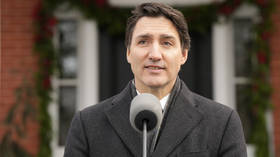RT Business interview with Alexander Izosimov, Head of Vimpelcom
Alexander Izosimov, Head of Vimpelcom, spoke with RT at the World Economic forum in Davos about the changed Russian business environment, and about how he sees the mobile industry evolving in Russia.
RT: Has investor’s sentiment towards Russia changed over the past six-eight months?
The sentiment has deteriorated dramatically, during the last 7-8 months. Hard to explain exactly why Russia suffered more than the others. I guess the perception is that oil and all raw materials and basic industries will be suffering more in this downturn. Second, Rouble exposure. And all of this, when it is built in is amplified by a general flight away from any risk, and from emerging markets, and therefore emerging markets tend to suffer more than developed markets. I guess all of this became a real big issue for investors when they deal with Russia.
If you also look at the relationship of debt pricing and equity pricing, you will see that Russian debt is discounted so heavily that anybody who wants to take exposure to the Russian market would rather go and buy bonds than go and buy equity.
So those factors I guess, drove our prices to such low levels that they are basically ridiculous. If I look at oil companies – ourselves even – in Christmas 2007 our shares were $45, now they are lower than $7, and the company actually became bigger by a good 30% since then. Hard to comprehend, but we are where we are.
RT: Has the crisis affected Vimpelcom’s competitive advantages? Your operations take place in a Rouble denominated market, which has been weakening significantly. How does this affect Vimpelcom’s investment plans? Do you think enough is being done to support the rouble? Should the Central bank leave the refinancing rate as it is now, or raise it or decrease it?
As far as competitive advantages are concerned, of the Russian companies, I think that Vimpelcom, as any telecom company, is mainly focused on the domestic market, and doesn’t export its services or goods, and therefore the devaluation of the currency makes our life more difficult. If you take steel manufacturers and so on, for them it would – over time – would certainly emerge as a massive advantage. For us, it’s tricky, because most of the equipment is priced in dollars, and supplied out of Europe or China, for that matter. And we borrowed money in dollars, and therefore the shrinkage of Rouble value, while we retain our margins, the operating cash flow, denominated in dollars, shrinks. And therefore to meet our obligations becomes slightly more challenging. Hence, naturally, we have to reconsider how aggressive we behave and how much risk we would be willing to take with the acquisitions or expansion, and we trim down those plans in order to be absolutely sure that we comfortably meet all of our existing financial obligations.
My favourite answer, my crystal ball is a little bit hazy today so its very very hard to say. Virtually impossible. We really don’t have any data points at the moment to reliably extrapolate, and say ok that’s what is going to be. So far we don’t see any significant impact on consumption of our services, and you almost project straight forward – whatever devaluation of Rouble is it flows through into our currency losses and adversely affects our net income. Clearly we do hedge our exposure, to some extent because its not the easiest currency to hedge, the Rouble, and therefore I would abstain from making any predictions here. Any of those predictions if I would have made them 2 months ago or 3 months ago, would have been dead wrong. So I am afraid that any predictions made now would be as wrong as those two months ago or three months ago.
I am not sure that support of Rouble to any greater extent would make any sense. We’ve seen many many examples when countries would burn their resources and their reserves and would end up still devaluing the currency. I think the Government chose, actually, quite a good and productive path, saying that, ok we are not going to devalue it overnight because that would really trigger panic, and unpredictable behaviour, which could ruin an already very fragile banking industry, and we will go on a gradual devaluation, which they implemented, and implemented faster than people expected. And I think the outcome is actually quite positive.
I think that as soon as people see that the Rouble has found its new equilibrium, some sort of a floor, the confidence will start coming back. Because, until that happens people will feel very uncomfortable investing in Russia and banks, Russian banks, will feel very uncomfortable lending money, borrowers will feel very uncomfortable borrowing in a hard currency, because they don’t understand their currency exposure, which is very difficult to hedge. Hence everybody is in limbo waiting for the Rouble to arrive to where its supposed to be. And therefore, a faster move, in that sense is probably better, but too fast would probably result in social impact – undesirable impact. And therefore they had to navigate between Scylla and Charybdis, and I think they’ve done pretty well.
For us its irrelevant, the interbank rate. And the issue is not the refinancing rate because there is money in the banking system. Its simply they blocked. There is a plug, which doesn’t allow, money to go into the real economy. The question is how to remove that plug, and dropping another percentage point is not going to do it, because the risk of default and the risk of bankruptcy is by far bigger than anything else the central Bank can offer – hence this monetaristic approach, to try to revive the economy. I don’t think its going to work. If the Government starts guaranteeing the borrowers – that could unlock those flows of money towards companies. However the interest rates of the bank, somehow, if they are reflected through the consumer loans and consumer credits, which are also almost dead, will impact inflation, then probably, high inflation is not in the best interests of the country. And again, how to find this balance – you have to be a central banker. But I believe, if you look towards the interest rates as a panacea for a stagnating economy, it’s not the case.
RT: What is your outlook for possible consolidation in mobile telecommunications sphere?
I think that if you look beyond the crisis, and you say, does it make industrial sense to consolidate, the answer is absolutely. On a single market, the scale effect matters, and, from the company perspective, it’s certainly a good idea. Hence last year we were saying a part of our strategy is actually to work as a vacuum cleaner, and whoever we could pick up we would have. Now it’s a question of valuation, prices and availability of financial resources. I think that life changed so fast, that the sellers are mentally simply not prepared to sell, unless it’s a very distressed sale – and therefore they will be expecting much higher prices – and the buyers are not prepared to buy, because they are looking at, we look at our multiples and we say you must be a total idiot to pay twice as much for some small company. So we are never going to do that either. Hence I think that it will be, for a while, a very quiet period on M&A. and when everybody stabilizes, and starts better understanding their future, and the new reality, whatever it is, then we will start seeing deals coming through. But as I said, industrial logic does exist.
If we talk about international consolidation, here I am less certain. Because I think the jury is still out. If you take Vodafone as the most typical example, and you take any company of Vodafone in the local market. They are not more successful than companies which don’t have international exposure, and therefore I would argue that it’s still difficult to realize cross border synergies in telecoms. But in the future, maybe, when the technology harmonizes. Being more harmonized, then you really can leverage scale in different ways compared to what we do now, maybe it will be more appealing.
For international consideration, people, probably companies, will emerge with quite a bit of financial resources, therefore they will deploy that resource. And actually it will come from people who have never been active internationally. It will be NTT, it would be Chinese, because China Mobile just bought one operation in Pakistan, and that’s it. They haven’t been international players. AT&T, they’ve never been outside. And Verizon, they also have never been outside. And I think those players might show some appetite for international expansion. So it might happen.
Russia as we? As us? I think that following the philosophy I have just outlined, we are not buying for sheer size and market share. If we see an opportunity to deploy our business model and take advantage of it, and we see an opportunity to buy a growth platform, so a market with a relatively low penetration, low income, which allows us to leverage our low cost structure and low cost approach to business, and be competitive there then certainly we’ll be interested. Vietnam, Cambodia, that’s where we started, and we’ll probably in the next year or two, learn quite a bit about how to operate in a non Russian language environment, which is a new paradigm for us. And I think that, if it works there, then certainly it can work in the middle east and Africa.
RT: Do you envisage retail-operator mergers? Or will they be acquired by telecom companies?
Well we answered that question by acquiring Evroset, and here the explanation probably lies in the fact of how structurally the industry developed. Retailers, for whatever reason, historically have been delivering a lot of value to the operators, and the benefit was disproportionately accumulated by the operators. No surprise almost all of them went to the verge of bankruptcy, and either, operators would redistribute part of their margins to the retailers, or simply absorb via vertical integration. I think that the latter is more likely. And we see that we acquired Evroset, and MTS announced that they are acquiring bits and pieces of Eldorado and so on. Megafon is talking about acquisitions. So as we have been discussing a year ago, as soon as one moves, it’s a pure prisoners dilemma, everybody will be forced to, and we see this chain reaction happening now.













